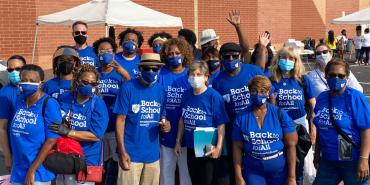Our students need to be—and stay—in their schools and on their campuses this school year. The positive effects of in-school learning are obvious. And while the delta variant is a huge challenge, it hasn’t changed our resolve to keep our schools and colleges open and to ensure that they are safe and welcoming. It means, however, we must use the tools that will keep our school communities safe: vaccines, masks, ventilation, hand washing, distancing, testing, and clear protocols if an outbreak occurs.
Schools’ and colleges’ greatest responsibility is protecting the lives of students and staff. Vaccination is the most effective tool we have to combat COVID-19. That’s why I personally have been urging everyone who is eligible to get vaccinated and why the AFT’s executive council unanimously approved a resolution to work with our employers on their vaccination policies and requirements, ensuring those policies are implemented fairly. And, to protect those who are not able to be vaccinated, including kids under 12 and those who require medical (or religious) exemptions, we’re calling for universal masking, frequent testing, and other mitigation strategies.
Today, we have the tools to emerge from this crisis, but they only work if we use them. It is unconscionable that some governors have been prohibiting mask requirements in schools. COVID-19 policies should be set by health and education officials whose first priority is keeping our students and staff safe—not by politicians.
The AFT’s Back to School for All campaign has been a Get Out the Vote–type campaign in support of in-person learning—and a vehicle to make it safe with our push for masking, testing, and vaccines. By the middle of August, we had invested $5 million to award upwards of 75 grants covering more than 1,800 AFT affiliates and engaging communities with 20 million students. Our members have talked to thousands of parents, done hundreds of walk-throughs of school buildings, stood up vaccine clinics, given away books, and yes, had some fun doing it. I know. I am crisscrossing the country: Visiting 20 states. Lifting up and supporting these Back to School efforts.
I’ve been met by a school band in Martinsville, Indiana, a bubble machine at the Safe Start Celebration in St. Louis, and a parrot named Olive with her high-school-student docent in Petaluma, California. I have been in countless classrooms where, even through the masks, I have witnessed the incredible work of educators who every day make real the promise and potential of public education for our students.
You—AFT union leaders and activists—are doing the hard work of engaging families, students, and communities on how to safely return to in-person learning five days a week. From kindergarten teachers to graduate school faculty, you all have been doing this work because you know that in-person learning is what’s best for students, their families, and our country.
You—AFT affiliates—have been holding vaccination clinics to combat the disinformation that is fueling vaccine hesitancy and to give lifesaving vaccines to more people. And you’ve been reconnecting with the families of students who attended school infrequently or not at all over the last academic year.
This is what solution-driven unionism looks like!
Schools and colleges are critical for kids’ and young adults’ recovery—academically, emotionally, and socially. This is our moment to first safely reopen and quell the virus, then reimagine education to create public schools and colleges where educators want to teach, families want to send their students, and all young people can learn and thrive.
In this issue of American Educator, a wide range of experts who care deeply about our youth—including educators, religious leaders, and economists—share their visions for reinvesting in public education as a public good. They offer a mix of well-established research and real-world examples of how we can support whole-child development by cultivating emotionally trustworthy, academically ambitious, and culturally affirming learning environments. And they demonstrate that America can afford to fully and equitably fund schools, colleges, and other institutions that are essential for family and community well-being.
As you arrive at your school or college each day, know that I am grateful for your dedication and that your union is fighting for you and your students.

